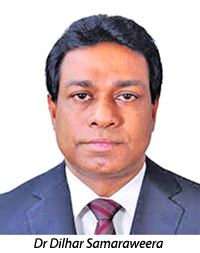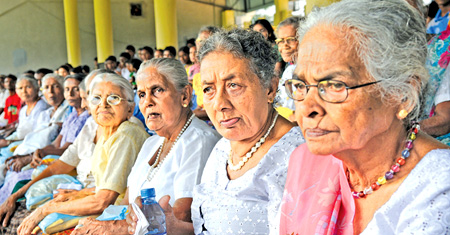
With celebrations of the season of festivity already begun, health officials are keen to ensure that no one including the elderly are left behind as we move forward to a new digitalised future under the new normalcy.
The Sunday Observer met Consultant Physician, Geriatrics and Palliative Care Unit, Colombo South Teaching Hospital, Dr Dilhar Samaraweera in an online interview to find out how Sri Lankan elders can enjoy the season to its fullest in spite of being in the midst of a Covid-19 pandemic.
Excerpts:
 Q. How do you categorise an Older Person? Is it the same in all countries? If not, why?
Q. How do you categorise an Older Person? Is it the same in all countries? If not, why?
A. Older person is categorised as over 60 years in the South East Asian region, in the west over 65 years considered as old. This is due to more developed health infrastructure in western countries where up-to 65 years people need no specialised management.
However, it is important to understand that functionality is most important as one grows old. Thus the biological age of a person which is decided by the physical and mental ability of a person for a particular age is more important than the chronological age which is the age by the birth certificate.
Q You were quoted by the media as saying that 1 in 4 will be ‘elderly’ (over 60 years of age) in Sri Lanka by 2041 due to our rapidly ageing population. Do you still maintain this view?
A.Yes.
Q. Right now we have a Covid -19 pandemic raging in the country. How vulnerable are elders to the pandemic and how does Covid impact on their health?
A. The Covid-19 pandemic took a heavy toll on the lives of the elderly in many countries. Sri Lanka has done better than many countries in this aspect. We have been able to protect the elderly population from this virus by prioritising vaccination of the over 60 years population. The measures taken to keep the elderly indoors and maintain physical distance and education on respiratory etiquettes has paid rich dividends.
That said, the older persons are not as vulnerable to covid as discussed in the media. Being old does not mean that you are doomed. The messages that older persons are at risk negatively affect their mentality resulting in psychological distress, depression. Older persons with underlying medical conditions such as cardiovascular disease, chronic respiratory disease, diabetes and cancer are more vulnerable to Covid -19 virus infection. However, they too survive if detected early and supported during their illness.
Physical distancing is believed to be the most effective approach for containing the virus. Physical distancing during the Covid pandemic has resulted negatively on physical and mental health.
Negative effects on physical health are reduced physical activity thereby increasing cardiovascular mortality, not being evaluated and examined in clinics with increased morbidity and mortality, increasing incidence of osteosarcopenia (muscle and bone mass reduction) and frailty. Negative effects on Mental Health are social isolation, depressive disorders, anxiety disorders and insomnia.
Q .What about those who have been tested positive ?
A. The elders who have been tested need not fear anymore, as there are many services available for assistance - by phone if you are at home, while the hospitals are well prepared with facilities to treat positive patients who have severe illness. Physical distancing is believed to be the most effective approach for containing the virus.
Q. What are the protective measures we have to safeguard their health from deteriorating?
A. The Ministry of Health, Sri Lanka Medical Association have helplines to give advice to patients in need. We have developed intensive care units, high dependency units to accommodate more patients and oxygen delivery facilities have been provided to the general medical wards.
Q. Do you have facilities for homecare or home visits by the MOH or PHI or Midwife? nursing?
A. Home visits are done by Public Health Inspectors (PHI) and midwives where necessary. We still do not have home care teams which visit homes to provide care at their own homes.
Public health nursing officers have been appointed for elderly and palliative care in the community.
 Q. There are warnings that we are likely to see a third wave in the near future soon. What arrangements have been put in place to meet this new challenge with regard to elders?
Q. There are warnings that we are likely to see a third wave in the near future soon. What arrangements have been put in place to meet this new challenge with regard to elders?
A. The elders have been vaccinated with two doses; booster vaccines have also been given. It is unlikely for another wave to cause mortality as experienced in the previous waves. The elders should be given the green light for social interaction. The activities of course should be with known groups who have been vaccinated. The older persons should have engagement with society to maintain physical and mental wellbeing. The precautions we take in prevention of covid 19 should continue despite the protection achieved with the vaccine.
Q. Sri Lanka has a rapidly ageing population. As a result, what are some of the health issues that are likely to spike among elders? Are they mostly neurological related issues? If so, what are they?
A. It is not correct to categorise the problems of ageing into systems, as most problems are due to deterioration of multiple systems and reduction of physiological reserves across systems. Incidence of dementia and depression increase with ageing, though both these problems are related to brain health, the causation as well as management of these diseases are multisystemic, not limited to the nervous system or any other single system. Thus, screening of issues in elderly should be done in physical, psychological and social domains. The goal should be to achieve successful ageing. It is about modifying behaviour to achieve optimal outcome during old age. Therefore, lifestyle modifications with a balanced diet and regular exercises would help older persons to enjoy physical and mental wellbeing.
Q. You have been quoted as saying that re-vamping and re-designing the health care system for geriatric care to facilitate better recreational and physical activities for elders should be a priority among the lists of Do’s for future health officials. Your comments?
A. The redesigning of the health care system should include programs for the wellbeing of the older persons. Hospitals should be designed with elderly friendly environment. District hospitals could cater to the demand of the elderly patients with space for physical activities, recreational activities and religious activities. The hospital diet should consist of options with different menus with palatability.
Q. What about the need to re-design transport services and pensions which are also specific needs of older adults who are physically or mentally unable to deal with them personally?. Your comments?
A. We are far from the ideal situation. Better, affordable and more accessible transport services and social security systems, pensions insurance schemes for older persons are needed to improve their quality of life. In 1991 the United Nations General Assembly adopted United Nations principles for older persons. The concept “Add life to the years that have been added to life” was introduced during this year. In 1999 International year of Older Persons’ - theme was“A society for all ages.” These concepts need to be practiced to enable a better life for the older persons.
Q. Since family physicians are familiar with the history and detailed records of the patient’s health background what is the role of the family physician in enhancing the quality of the older patient?
A. Family physicians are expected to deliver care at first contact level. Their role is to identify problems of the elderly at primary care level and manage them effectively preventing unnecessary burden on the tertiary care hospitals. Family Physicians with a very good knowledge of family and social dynamics of the older person can deliver care to the older person closer to their homes and even arrange home visits improving accessibility of health care to the elderly in the community.
Q. What are the main goals for elderly care as spelt out by the UN”?
A. The United Nations General Assembly declared 2021–2030 as the Decade of Healthy Ageing. Ensuring that health systems are accessible, available and affordable to all, including older people is a challenge. The United Nations with the World Health Organization have launched many activities to uplift the health of older persons. The WHO has started an Integrated Care of Older Persons (ICOPE) approach for primary care of the older persons. Development of strategies for Long term Care Facilities (LTC)is also on the agenda of the decade of healthy ageing. The United Nations High Commission for Human Rights has recognised discrimination on the grounds of ageing as a major human rights issue.
Q. “Digital Equity for All Ages” was the theme of this year’s International Day of Older Persons. What is the significance of this theme and why was it selected for this year?
A. The 2021 theme “Digital Equity for All Ages” affirms the need for access and meaningful participation in the digital world by older persons. Technological advances offer great hope for accelerating progress towards the Sustainable Development Goals (SDGs). Yet, one-half of the global population is off-line, with the starkest contrast between the most developed countries (87 percent) and the least developed countries (19 percent) The digital inclusion for all concept is retarded due to the digital divide which exists between countries communities and people. Enabling all the world’s people to access and use digital technologies and closing digital divide is a challenge that needs to be addressed to achieve Sustainable Development Goals (SDGs) by 2030.
Q. Your message to the public ?
A. The older persons in our country are fortunate to have survived a pandemic which has taken many lives in the other parts of the world. We in Sri Lanka still have a supportive extended family and a rich culture which respects the rights of older persons. Thus, the future is not bleak as it seems. We could achieve a society for all despite economic setbacks due to the present Covid pandemic. The older persons need to realise that chronological age does not matter in achieving your personal goals. What matters is not how many years you live but how you live your life until death.
Q. As we now move forward under the new normalcy, and keeping the upcoming season of festivity in mind, since this is a time for family gatherings, share with us your views on how we can preserve the all important family unit this season amidst the pandemic.
A. As you said, the family unit is very important, especially for elders. So if everyone in the family has been tested and treated and got vaccinated, then we should remove barriers within the family. Maintaining good family life and connectivity is very important especially as we are living in such stressful times. Wearing a mask at home is not needed anymore, but should be worn when meeting people from outside. However, if you are unwell stay away from such gatherings and wear a protective face mask which will protect the rest of your family including the elderly.
